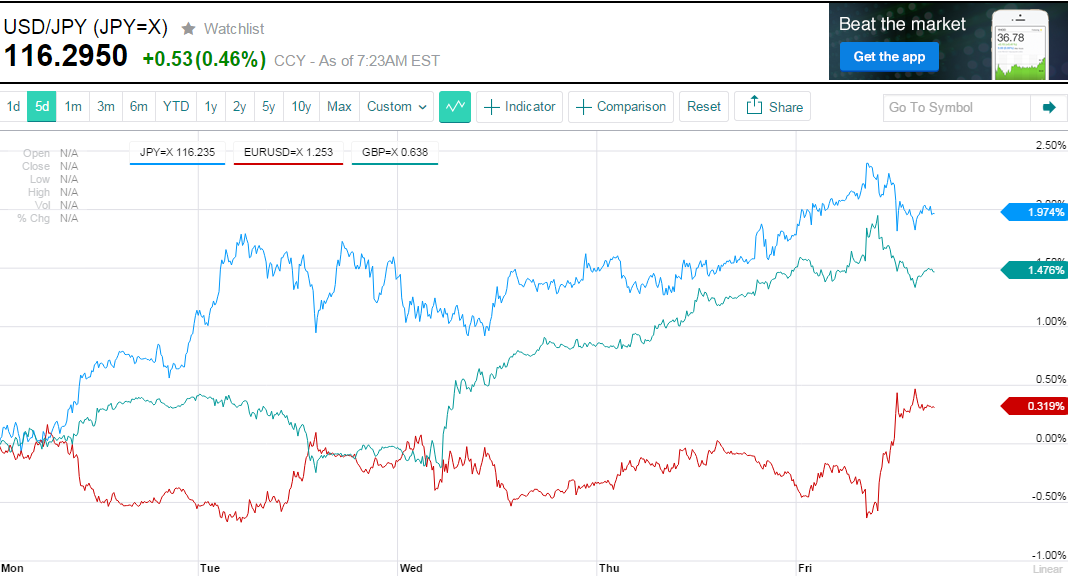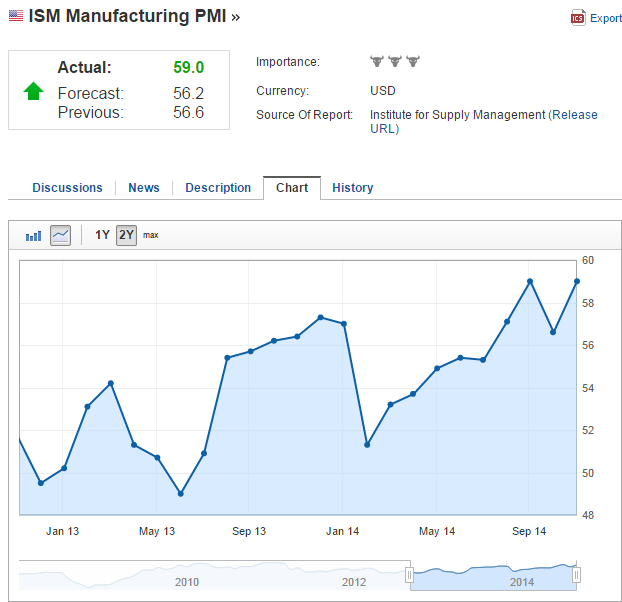The S&P 500 increased by 0.27% without a significant movement recognized this week. As investors are already influenced by interest rate issues, U.S. market focused more on company earning and other financial market indexes. Yet there were several economic indicators that affect on the market. JOLTS Job Opening decreased and Initial Jobless Claim increased, but they are still considered in the "safe" level that labor market is still improving. Retail sales increased by 0.3% and import price declined by 1.3%. As oil price continuously declined, retail price had got cheaper and increase consumer spending. It might be helpful for U.S. economy, but it can restrain inflation rate. The President of Federal Reserve Bank of Philadelphia Charles Plosser, on the other hand, urged that the markets should acknowledge the interest rate may begin to increase sooner than previously anticipated. It means that even though strong dollar and decrease in oil price are temporary factors that the Fed. believes that inflation will move close to the Fed.'s goal quickly. There are still different views in the Fed. that the investors are taking moments before moving their steps.
Asian market continuously rose as Chinese government implemented Hu-gang Tong that links Shanghai-Hong Kong to exchange shares. Japanese government might delay sales-tax that planned in April. There are still high political risks and uncertainties, but the market is positively reacting as the cabinet pushing hard to delay the proposal.
While Japanese Yen kept depreciating, the delay of sales-tax gave a positive outlook on the market. While real income stagnated, increasing sales-tax would give opposite results that decreasing consumer consumption, which eventually put the economy into temporary recession. The problem of Japanese economy is not only inflation rate. In a long term, the government needs to worry about government debt and keeping the market confidence without government stimulus. Because the government is unsure about whether the companies can keep up its growth after sales-tax increase, it now tries to delay it.
With depreciated Japanese Yen, Japanese Adjusted Current Account rose more than expected. But the increment caused by weak Yen, not increase of exports. Chinese Industrial Production declined to 7.7% as the global economy slows down.
European economy needs more time to recover than previously anticipated. The Bank of England Inflation Report projects that United Kingdom will experience growth of 3.5% this year, 2.9% next year and 2.6% for each of the following two years; it is slightly weaker than growth projection in August. Its inflation rate is projected to fall to 1.2%, and expect it to fall below 1% at some point during next six months. As a result, the BOE is pessimistic about increasing interest rate in a short term; it will keep current low interest rate for a long time. It brought a positive perspective on the market, reading FTSE 100 to 1.11% increase this week.
Other than U.K., EU economic indicators generally show positive economic outlook. Even though its CPI and GDP stagnated at 0.4% and 0.8%, German GDP got out of technical recessions. But there were high tensions between Ukraine and Russia this week, which restricted market movement in Germany. The ECB is still pessimistic about additional stimulus; it seems like investors need better economic outlook to believe in market. The ECB President Mario Draghi stated on Wednesday that the ECB is already implemented three stimulus program: TLTROs, ABS and covered bonds purchasing programs. He explained that those stimulus need more time to have an impact on the market, which suggests that the ECB would not put additional stimulus in a short term.


Yen still depreciated as it adds more and more stimulus, and U.K. Pound also depreciated as the BOE decided to keep low interest for a long time. With strong USD coming from low oil price, most of the currencies against USD depreciated this week, and this phenomenon is likely to continue for a mean time.
Crude Oil has been an ongoing issue that hurts global economy for last six months. Because supply has increased while the consumption has not caught it up as the global economy slows down, oil price continuously decreased. As matter of fact, recent industrial production data in China and EU doesn't show a big improvement that this low oil price is likely to continue.














